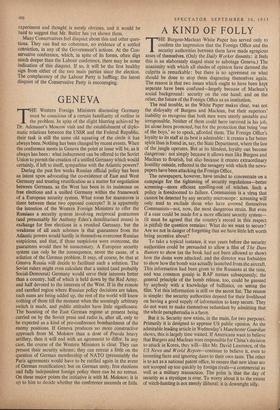GENEVA
THE Western Foreign Ministers discussing Germany must be conscious of a certain familiarity of outline in the problem. In spite of the slight blurring achieved by Dr. Adenauer's Moscow visit and the establishment of diplo- matic relations between the USSR and the Federal Republic, their task is still the same old squaring of the circle it has always been. Nothing has been changed by recent events. When the conference meets in Geneva the point at issue will be, as it always has been: what inducement can be offered to the Soviet Union to permit the creation of a unified Germany which would certainly, if left to itself, sympathise with the Atlantic powers?
During the past few weeks Russian official policy has been as intent upon advocating the co-existence of East and West Germany and treating reunification as a matter for negotiation between Germans, as the West has been in its insistence on free elections and a unified Germany within the framework of a European security system. What room for manoeuvre is there between these two opposed concepts? It is apparently the intention of the Western Foreign Ministers to offer the Russians a security system involving reciprocal guarantees (and presumably Sir Anthony Eden's demilitarised zones) in exchange for free elections in a reunited Germany, but the weakness of all such schemes is that guarantees from the Atlantic powers would hardly in themselves overcome Russian suspicions, and that, if those suspicions were overcome, the guarantees would then be unnecessary. A European security system can only be the consequence, never the cause, of a solution of the German problem. It may, of course, be that at Geneva Russia will decide to facilitate such a solution. The Soviet rulers might even calculate that a united (and probably Social-Democrat) Germany would serve their interests better than a country, half of which is held down by the Red Army, and half devoted to the interests of the West. If in the remote and rarefied region where Russian policy decisions are taken, such sums are being added up, the rest of the world will know nothing of them till the moment when the seemingly arbitrary switch is made, and public attitudes have little significance. The boosting of the East German regime at present being carried on by the Soviet press and radio is, after all, only to be expected as a kind of pre-conference bombardment of the enemy positions. If Geneva produces no more constructive approach from M. Molotov than a dose of Pravda heavy artillery, then it will end with an agreement to differ. In any case, the course of the Western Ministers is clear. They can present their security scheme; they can retreat a little on the question of German membership of NATO (presumably the Paris agreements would have to be ratified again in the event of German reunification); but on German unity, free elections and fully independent foreign policy there can be no retreat. On these major points the initiative is with M. Molotov; it is up to him to decide whether the conference succeeds or fails.


































 Previous page
Previous page